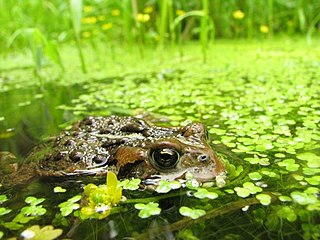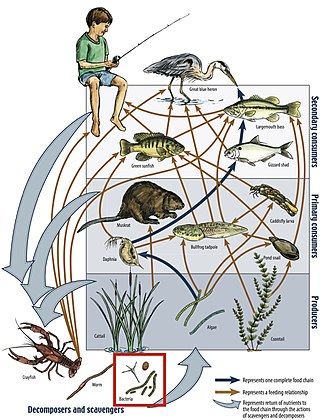Related Research Articles

Ecology is the study of the relationships among living organisms, including humans, and their physical environment. Ecology considers organisms at the individual, population, community, ecosystem, and biosphere level. Ecology overlaps with the closely related sciences of biogeography, evolutionary biology, genetics, ethology, and natural history. Ecology is a branch of biology, and it is not synonymous with environmentalism.
A hierarchy is an arrangement of items that are represented as being "above", "below", or "at the same level as" one another. Hierarchy is an important concept in a wide variety of fields, such as architecture, philosophy, design, mathematics, computer science, organizational theory, systems theory, systematic biology, and the social sciences.
Systems theory is the interdisciplinary study of systems, i.e. cohesive groups of interrelated, interdependent components that can be natural or human-made. Every system has causal boundaries, is influenced by its context, defined by its structure, function and role, and expressed through its relations with other systems. A system is "more than the sum of its parts" by expressing synergy or emergent behavior.

Theoretical ecology is the scientific discipline devoted to the study of ecological systems using theoretical methods such as simple conceptual models, mathematical models, computational simulations, and advanced data analysis. Effective models improve understanding of the natural world by revealing how the dynamics of species populations are often based on fundamental biological conditions and processes. Further, the field aims to unify a diverse range of empirical observations by assuming that common, mechanistic processes generate observable phenomena across species and ecological environments. Based on biologically realistic assumptions, theoretical ecologists are able to uncover novel, non-intuitive insights about natural processes. Theoretical results are often verified by empirical and observational studies, revealing the power of theoretical methods in both predicting and understanding the noisy, diverse biological world.

Reductionism is any of several related philosophical ideas regarding the associations between phenomena which can be described in terms of other simpler or more fundamental phenomena. It is also described as an intellectual and philosophical position that interprets a complex system as the sum of its parts.

A food web is the natural interconnection of food chains and a graphical representation of what-eats-what in an ecological community. Another name for food web is consumer-resource system. Ecologists can broadly lump all life forms into one of two categories called trophic levels: 1) the autotrophs, and 2) the heterotrophs. To maintain their bodies, grow, develop, and to reproduce, autotrophs produce organic matter from inorganic substances, including both minerals and gases such as carbon dioxide. These chemical reactions require energy, which mainly comes from the Sun and largely by photosynthesis, although a very small amount comes from bioelectrogenesis in wetlands, and mineral electron donors in hydrothermal vents and hot springs. These trophic levels are not binary, but form a gradient that includes complete autotrophs, which obtain their sole source of carbon from the atmosphere, mixotrophs, which are autotrophic organisms that partially obtain organic matter from sources other than the atmosphere, and complete heterotrophs that must feed to obtain organic matter.

The term autopoiesis refers to a system capable of producing and maintaining itself by creating its own parts. The term was introduced in the 1972 publication Autopoiesis and Cognition: The Realization of the Living by Chilean biologists Humberto Maturana and Francisco Varela to define the self-maintaining chemistry of living cells.
Ecology is a new science and considered as an important branch of biological science, having only become prominent during the second half of the 20th century. Ecological thought is derivative of established currents in philosophy, particularly from ethics and politics.
In ecology, an ecosystem is said to possess ecological stability if it is capable of returning to its equilibrium state after a perturbation or does not experience unexpected large changes in its characteristics across time. Although the terms community stability and ecological stability are sometimes used interchangeably, community stability refers only to the characteristics of communities. It is possible for an ecosystem or a community to be stable in some of their properties and unstable in others. For example, a vegetation community in response to a drought might conserve biomass but lose biodiversity.

Systems ecology is an interdisciplinary field of ecology, a subset of Earth system science, that takes a holistic approach to the study of ecological systems, especially ecosystems. Systems ecology can be seen as an application of general systems theory to ecology. Central to the systems ecology approach is the idea that an ecosystem is a complex system exhibiting emergent properties. Systems ecology focuses on interactions and transactions within and between biological and ecological systems, and is especially concerned with the way the functioning of ecosystems can be influenced by human interventions. It uses and extends concepts from thermodynamics and develops other macroscopic descriptions of complex systems.

Biological organisation is the organisation of complex biological structures and systems that define life using a reductionistic approach. The traditional hierarchy, as detailed below, extends from atoms to biospheres. The higher levels of this scheme are often referred to as an ecological organisation concept, or as the field, hierarchical ecology.
Agroecosystem analysis is a thorough analysis of an agricultural environment which considers aspects from ecology, sociology, economics, and politics with equal weight. There are many aspects to consider; however, it is literally impossible to account for all of them. This is one of the issues when trying to conduct an analysis of an agricultural environment.
An integrative level, or level of organization, is a set of phenomena emerging from pre-existing phenomena of a lower level. The levels concept is an intellectual framework for structuring reality. It arranges all entities, structures, and processes in the universe, or in a certain field of study, into a hierarchy, typically based on how complex their organization is. When arranged this way, each entity is three things at the same time: It is made up of parts from the previous level below. It is a whole in its own right. And it is a part of the whole that is on the next level above. Typical examples include life emerging from non-living substances, and consciousness emerging from nervous systems.
Timothy F. H. Allen is a British botanist and former Professor of Botany and Environmental Studies at the University of Wisconsin–Madison. Allen is a leader in the fields of hierarchy theory, systems theory, and complexity.

Arne Dekke Eide Næss was a Norwegian philosopher who coined the term "deep ecology", an important intellectual and inspirational figure within the environmental movement of the late twentieth century, and a prolific writer on many other philosophical issues. Næss cited Rachel Carson's 1962 book Silent Spring as being a key influence in his vision of deep ecology. Næss combined his ecological vision with Gandhian nonviolence and on several occasions participated in direct action.
A social-ecological system consists of 'a bio-geo-physical' unit and its associated social actors and institutions. Social-ecological systems are complex and adaptive and delimited by spatial or functional boundaries surrounding particular ecosystems and their context problems.

The extended evolutionary synthesis consists of a set of theoretical concepts argued to be more comprehensive than the earlier modern synthesis of evolutionary biology that took place between 1918 and 1942. The extended evolutionary synthesis was called for in the 1950s by C. H. Waddington, argued for on the basis of punctuated equilibrium by Stephen Jay Gould and Niles Eldredge in the 1980s, and was reconceptualized in 2007 by Massimo Pigliucci and Gerd B. Müller. Notably, Dr. Müller concluded from this research that Natural Selection has no way of explaining speciation, saying: “selection has no innovative capacity...the generative and the ordering aspects of morphological evolution are thus absent from evolutionary theory.”
In the study of complex systems and hierarchy theory, the concept of scale refers to the combination of (1) the level of analysis ; and (2) the level of observation. The scale of analysis encompasses both the analytical choice of how to observe a given system or object of study, and the role of the observer in determining the identity of the system. This analytical tool is central to multi-scale analysis.
Cultural evolution is an evolutionary theory of social change. It follows from the definition of culture as "information capable of affecting individuals' behavior that they acquire from other members of their species through teaching, imitation and other forms of social transmission". Cultural evolution is the change of this information over time.

Philosophy of ecology is a concept under the philosophy of science, which is a subfield of philosophy. Its main concerns centre on the practice and application of ecology, its moral issues, and the intersectionality between the position of humans and other entities. This topic also overlaps with metaphysics, ontology, and epistemology, for example, as it attempts to answer metaphysical, epistemic and moral issues surrounding environmental ethics and public policy.
References
- ↑ Allen, Timothy F. H. (2001). "A summary of the principles of hierarchy theory". Archived from the original on 2001-12-18. Retrieved 2016-03-19.